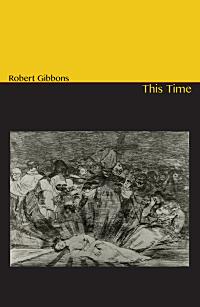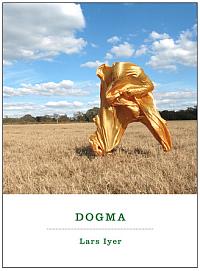|
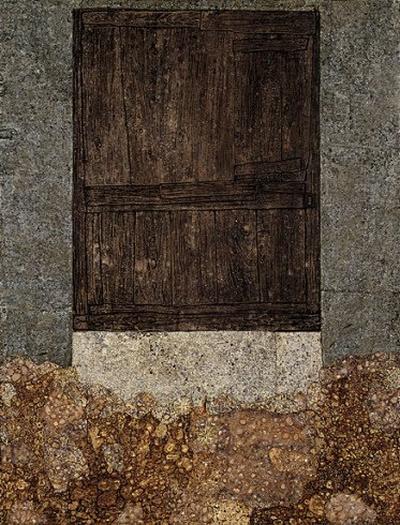
Door with Couch Grass
1957
Jean Dubuffet
b. July 31, 1901
_______________________
After Midas
G.C. Waldrep
for Ilya Kaminsky
The animals are important, this much
is certain.
Outside the silica gate
a barber kneels in the glassine dust
to adjust
first his shoes, then his spectacles.
All poetry sounds the same
when spoken through the mouth,
a place
where the broken man hides his clothes.
The best stories end. God is
a thin peel
on a golden apple, no a stolen apple
inside of which something
ticks, like a dead bell or a bomb.
This is how we enter the city.
Hear us
clank against one another,
Fold bell, fold birch, tear here—
dull as ivory chessmen
the retreating soldiers, ravaged at noon,
never bothered to recover
from winter’s luxe & depthless hole.
Ostrich Review
inaugural issue
_______________________
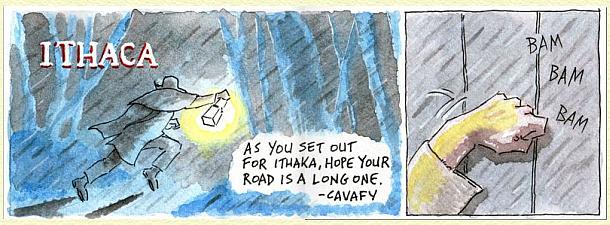
Ithica
A graphic novel in several parts
Josh Brown
The war is over.
It is a time of hope, a time of possibility. A time of betrayal.
Old ways twist into deceptive shapes that menace the new.
In a conquered land, freedom has many meanings—but only one will prevail.
A body is found, accusations topple into violence, a traveler returns…
Common-Place - July 2012
_______________________
The Art of Translation: Kuprin’s The Duel
Josh Billings
moby lives
Throw a dart into a crowd of translators and you will hit the famous Italian cliché, Traduttore, traditore: a phrase that no less an authority than the translator/poet/demi-god Eliot Weinberger has called “tedious,” but which persists, like Garth Brooks in a karaoke queue, despite our best efforts to eradicate it. Renditions that I’ve seen include: the spartan “Translator, traitor,” (from Gregory Rabassa’s memoir If This Be Treason), the more Telemundo-worthy “Translator, you betray!” (via Los Vengadores, a comprehensive Spanish website devoted to the British TV show The Avengers), and of course (compliments Google Translate, that bastion of translational excellence) “Purple monkey dishwasher.” Which leads us to our first translating rule of thumb: beware false cognates.
Beware them, translator! But translators do not beware. Headstrong and flushed, we dive into our texts with reckless abandon or worse, with hope. Weeks, months, even years later we bob to the surface clutching hunks of Styrofoam. But it was different, we gasp! She was there! The sting of failure persists until, safely back on land, we teach ourselves to smile ironically and sniff out the Italian phrase, taking refuge in the convenient, if utterly ridiculous idea that we were the traitors. But in our hearts we know better. You can’t betray what you never had — you can only go back for it, and fail again, proclaiming like the fool you are that the next time will be your last.
...(more)
_______________________
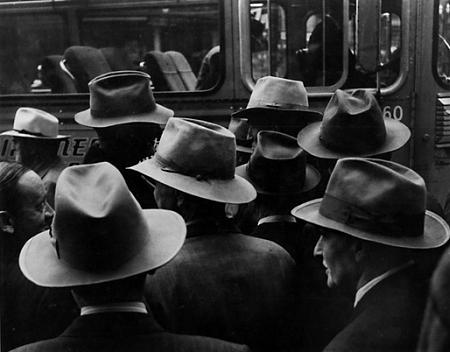
William Heick
1951
_______________________
Existing in New York City: With a Friend Who Wears a Lot of Hats
The Daily Growler celebrates languagehat's tenth with some colorful personal reminiscences.
_______________________
If there is a God, then anything is permitted
Slavoj Zizek
(....)
Most people today are spontaneously moral: the idea of torturing or killing another human being is deeply traumatic for them. So, in order to make them do it, a larger "sacred" Cause is needed, something that makes petty individual concerns about killing seem trivial. Religion or ethnic belonging fit this role perfectly. There are, of course, cases of pathological atheists who are able to commit mass murder just for pleasure, just for the sake of it, but they are rare exceptions. The majority needs to be anaesthetized against their elementary sensitivity to another's suffering. For this, a sacred Cause is needed: without this Cause, we would have to feel all the burden of what we did, with no Absolute on whom to put the ultimate responsibility.
Religious ideologists usually claim that, true or not, religion makes some otherwise bad people to do some good things. From today's experience, however, one should rather stick to Steven Weinberg's claim: while, without religion, good people would have been doing good things and bad people bad things, only religion can make good people do bad things....(more)
_______________________
Hegemony, Nationalism and Doxa: A Social Semiotic Analysis
Guy F. Shroyer
Narratives can be used to convey versions of reality and truth, and therefore they are a fundamental resource in the instantiation of power relations based upon the production and reproduction of what Pierre Bourdieu calls doxa: the natural, the unquestioned. In US political culture since the Second World War, American involvement in constant warfare has become doxic in this sense. Uninterrupted military engagement throughout the world outside of US borders has become naturalized, and narratives, in a sense, storytelling, have been instrumental in accomplishing this naturalization of constant US involvement in war. What exactly makes these narratives effective, how is it that particular realities are produced, and through what means are they disseminated?
This paper will analyze narratives about war, targeted to schoolchildren, in terms of their sense of movement, or profluence, their story world space and time configuration(s), or chronotopes, their arrangement of semiotic material producing limitations and affordances for interpretation, and their motive configuration(s) that foreground and background certain evaluations of the stories being told. The narratives analyzed through this method are relevant to the production and reproduction of acceptance of war and global hegemony because they are linked through the Web to the sites of primary national identity construction, the public schools, and appropriated as teacher resource databases for social studies content development, for dissemination to the students themselves, and for public school activities. In using this method of analysis, we can see how the given narrative structure in the data works to produce supportive stories that serve to justify policies of armed conflict through the social construction of naturalness and thus, consent....(more)
Social Science Research Network
_______________________

Jean Dubuffet
1959

photo - mw
_______________________
Years After the Garden
Linda Pastan
(....)
How beautiful the world is in the morning.
Flowers and vegetables, forests tremble.
How beautiful the world is in the morning.
Years ago the garden closed on Adam.
Hold my hand, I hear the waters rising.
...(more)
Linda Pastan at the Poetry FoundationLinda Pastan, “Q and A”beatrice
_______________________
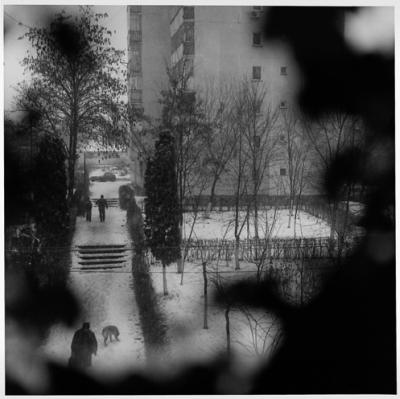
The Other Side
Masako Miyazaki
Japan Exposures
_______________________
Eye of Witness (1): A Letter & a Poem for Robert Duncan, in Retrospect
Jerome Rothenberg
The Counter-Dances of Darkness
The Text
All life is oriented to the light from which life comes. The bees in
their dances are oriented to the sun and, if it is dark, will dance in
relation to a candle flame.
Robert Duncan, The Day Book
The Commentary
I
But that the bee could be seeking death, oblivion, was also clear & would, in some sense, make that dance more fierce—more precious too? We noticed other movements as well, movements away from light, of the animals who burrowed in our hill, the night creatures stiffened by beams from my flashlight, the roots of all things curving back into earth’s belly, the penis into the womb of the woman. Could light teach us the whole dance without the counter-dance of darkness?
2
There is no light or darkness that, in itself, can orient us to where we become, but only a constant shift of planes between the two—light & darkness, life & death, speech & silence, sight & blindness. “The dark,” wrote Lorca, “wants to become light,” but the Gabon pygmies told us, “The light becomes darkness / the night & again the night / the day with hunger tomorrow.”
(....)
The Dances
(....)
6
The existence of the horrible in every particle
of air—
among its roots, submerged in droplets—vision!
You were not immune to it—neither at evening
with the rain still in your hair
nor in the garden at noon—not the first to be
spared, to raise a cry
against its stars—what imbecile regrets for all
your nights of silence!
No one had dreamed your pain then—how it
would draw the fingers back
would drive its roots inside you—muscle &
joint, the knot, the hard enclosure—death?
Around you the air was suddenly alive—
whole cities full of the “luckless dead” —
pavilions—marchers
but your heart couldn’t contain it—like the
universe it shrank, became your fist
abandoned in the rain, the odor clings to it—
& there are places in the dark where no light
enters,
where a hand moves slowly through the
silence, on the wall
a pressure that was like the earth, took
color from it—
your shadow in my blood—for we were
someone’s dream of vengeance.
...(more)
_______________________
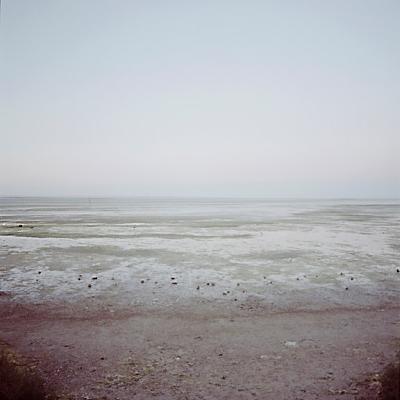
Early Morning Venus Bay
Encounters with an Outer Land
Katrin Koenning
via
_______________________
Never has society been as absorbed in the ceremonials of the "problem", and never has it been so democratically uniform in every sphere of socially-guaranteed survival. As differentiations between classes gradually fade, new generations "flower" on the same stalk of sadness and stupor; which is explained away in the widely publicized eucharist of the "problem." And while the most extreme leftism - in its most coherent form - calls for pay for every one, capital caresses ever less modestly the dream of giving it what it wants: of purging itself of the pollution of production and allowing men the freedom to simply produce themselves as capital's empty forms, its containers, each one confronted with the same enigma: why am I here?
-
Giorgio Cesarano, Manuale di sopravivvenza
[Survival Manual] (1974) quoted in
This is Not a Program
Tiqqun:
(2001/2011)
pdf available at Monoskop/log
_______________________
The Rise of the Police State and the Absence of Mass Opposition
James Petras and Robin Eastman Abaya
global research
(....)
The question is why has the police state grown and even exceeded the boundaries of previous periods of repression and yet not provoked any sustained mass opposition? This is in contrast to the broad-based pro-democracy movements of the mid to late 20th century. That a massive and growing police state apparatus exists is beyond doubt: one simply has to look up the published records of personnel (both public agents and private contractors), the huge budgets and scores of agencies involved in internal spying on tens of millions of American citizens and residents. The scope and depth of arbitrary police state measures taken include arbitrary detention and interrogations, entrapment and the blacklisting of hundreds of thousands of US citizens. Presidential fiats have established the framework for the assassination of US citizens and residents, military tribunals, detention camps and the seizure of private property.
Yet as these gross violations of the constitutional order have taken place and as each police state agency has further eroded our democratic freedoms, there have been no massive “anti-Homeland Security” movements, no campus ‘Free Speech movements'. There are only the isolated and courageous voices of specialized ‘civil liberties’ and constitutional freedoms activists and organizations, which speak out and raise legal challenges to the abuse, but have virtually no mass base and no objective coverage in the mass media.
...(more)
_______________________
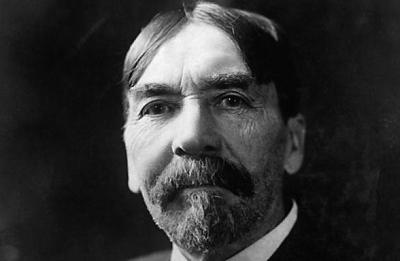
Thorstein Veblen
b. July 30, 1857
All business sagacity reduces itself in the last analysis to judicious use of sabotage.
The Theory of the Leisure Class [pdf]
Thorstein Veblen
_______________________
In the Land of Never Was
The Last, Desperate Hours of Climate Chaos Deniers and Capitalist Rah-Rahs
Phil Rockstroh
_______________________

photo - mw
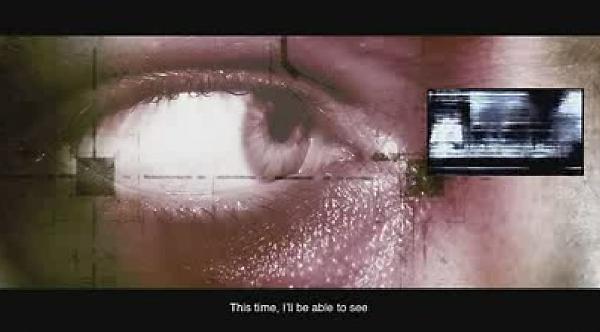
Playing God: The Loving Psychopath
youtube
Original monologue written and voiced by Phil Hellenes
Music and Graphics by Ben Kokolas
_______________________
The contained
Stefan Jonsson
(....)
Even economists of the neoliberal school – indeed, they above all – admit that it is in the nature of capitalism to create wealth through the creation of poverty, and that it creates poverty in order to create wealth. This is why Marxists have consistently demanded the abolition of capitalism. This is also why most others have demanded, as a minimum requirement (and along the lines of Karl Polanyi), that capitalism must be embedded, that is, constrained by regulations aiming to redistribute the wealth that capitalism has created to those suffering from the poverty arising as a result of the very same process.
For the last three decades, however, the scenario has been the opposite one: a neoliberal regime that has managed to embed society in capitalism. Its proponents recommend that European welfare societies subordinate themselves in the same way as the rest of the world. There, politics has long served to motivate the release of the market in pure form, exposing people and the environment to the wealth-producing forces of capitalism. These forces must not be blocked by artificial political measures; the poor must accept their poverty as a consequence of the wealth accumulated by the rich, thus turning resignation into economic necessity.
The consequences are grotesque.
(....)
The container is the universal unit of the global commodity society; a form that adapts to all kinds of products and contents, that facilitates their swift exchange. Correspondingly, the precariat seems to be a term that refers to a basic form of labour, which submissively and flexibly adjusts to any kind of workplace, form of employment and system of production. It is no accident, then, that The Wire makes container traffic the very hub and centre of its mapping of twenty-first century society. One might even add that the human collective represented by David Simon's Baltimore is generated by and is living according to the logics of the container. This applies increasingly to us all. It should not come as a surprise, then, that the processing of containers is usually handled by men and women living in precarious circumstances. Think of those who assemble the goods to be packed into the containers, who load and unload them, and who also hide or are locked up inside them. ...(more)
_______________________
Mega-ports
On the new geography of containerization
eurozine
Ports as points of juncture in the globalized transport network, operating mechanisms of access and arrest; the oceans remapped by containerization, cargo-shipping setting the pace of world commerce; the new harbours as decontextualized zones, nautical memories recycled for heritage: Olivier Mongin outlines a social geography of the global maritime system.
_______________________
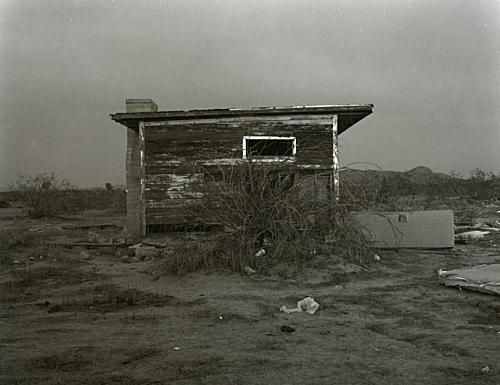
Dusk #33
Records
Mark Ruwedel
Yossi Milo Gallery
via
_______________________
From Pen Chants or nth or 12 spirit-like impermanences
Lissa Wolsak
~
The destination of all sung poetry
organs of walking
uncoffer lakelight, schoon
people at their most innocent
what final urge
is not met by
ritualised fainting
embodiment of seizure
gravid habit and fear.
Yma Sumac, on that scarp
ebbist…. nimbi kneeling
o soil,
what mouth-torch?
~
...(more)
Lissa Wolsak at EPC
Squeezed Coherence
Introduction to Lissa Wolsak's Squeezed Light: Collected Poems
George Quasha
The Lissa Wolsak Issue
The Poetic Front
Vol 4, No 1 (2011)
"Ardor is its undermost shaping":
An Interview with Lissa Wolsak
_______________________
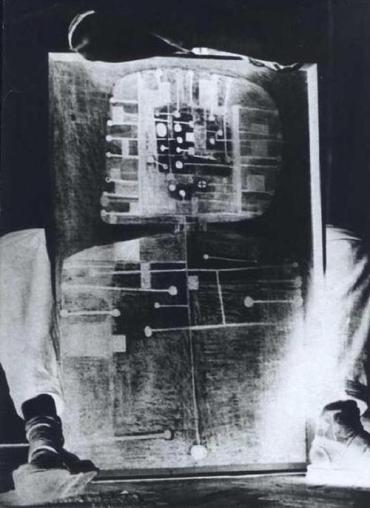
Jerzy Lewczynski
1959
_______________________
An Heuristic Prolusion
Lissa Wolsak
How2
Why write, if not in the name of an impossible speech?
—Michel de Certeau
~ I speak as one silenced. Transhumance, as understood and utilized in late 12th C. early 13th C. France, was an agricultural motion or migration, a seasonal moving of livestock and the people who tend them, but transhumance also was a possible personal-social act of symmetry, reciprocity and redistribution. Co-mercy, the art of harmlessness, equivocating sexual/ theological, fiat, fiat lux,…to lay the supremely ambiguous, phantomatic faces…to let, to kneel, along the place of the abyss, to linger as long as possible…where the same relation may be observed throughout the whole universe, where significance “bleeds into an unconstrainable chain.”
What lies beneath my copy of eternity?
What coils up...in spoken space?
(....)
~ Soul is under erasure. I peer into the sacrificial machinery, to find an interpretive tool. Sign and signified in defeat/detente. Language (and silence), the site of resistance to denounce current economic hegemonies and—lay disarming alternatives to unambiguous genocides…To adulterate the g-forces in the sensation of defeat and cultural materiality of being, and to exonerate ourselves from limiting definitions of reality. Withdrawing authority, in re-assumption of autonomy…
In world-wide ideological deadlock each part of the planet, persisting terrorism, and urging war. Enervated surfaces, against an arras of overwhelming bathos, in everyday speech.
Capitalism’s everything and nothing…depthlessness, euphoric waves of consumption, mimetic desire…disillusions of autonomy, hunger and grasp… “left to the masses is that of grazing on the ration of simulacra the system distributes to each individual,” “what is audible, but far away, will thus be transformed into texts in conformity with the western desire to read its products.”
Prophetic utterance is magical in the sense of having the greatest possible penetrating power.(....) ...(more)
_______________________
Space Poetry
Sun Ra (1914-1993)
spoken word poetry with musical accompaniment
ubu
_______________________
Cimetičre Marin
Paul Valéry
translated by Tim Smith-Laing
(....)
Calm mass of arrogance, close-kept trove of light,
this tide is Minerva’s simplest shrine, an Eye
of visible reserve, upturned, restraining
such a store of rest beneath its veil of flames,
O my silence! … constructed in the soul,
but, Roof, golden summit to a thousand tiles.
Time’s temple, summed in a sigh’s loneliness,
I accustom myself to the cliff’s crest,
surrounded by the sight of burning sea;
and, as if it were my highest offering
to the gods, the flecked fires sow, serene,
upon this height, a sovereign disdain.
...(more)
Wave Composition
_______________________
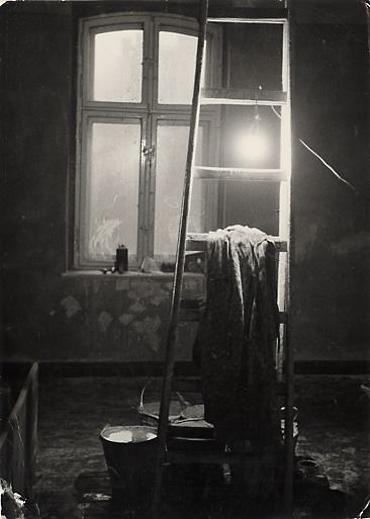
Still life
Jerzy Lewczynski
1952
Living Legend: Polish Photographer Jerzy Lewczynski
LensCulture Memory of the Image
photographs by Jerzy Lewczynski
interview by KED Olszewski
lens culture
_______________________
Reading Graphs, Maps, and Trees: Responses to Franco Moretti
a Valve book event
Jonathan Goodwin, John Holbo (eds.)
(2011)
Franco Moretti’s Graphs, Maps, Trees: Abstract Models for Literary History is one of the most provocative recent works of literary history. The present volume collects generalist and specialist, academic and nonacademic responses by statisticians, philosophers, historians, literary scholars and others. And Moretti’s responses to these responses. Originally written as contributions to an online book event hosted at The Valve, and edited for this volume, these essays explore, extend and criticize many aspects of Franco Moretti’s work. They will be of interest to anyone interested in Moretti’s brand of “distant reading”; or in the prospects for quantitative approaches to literary style and genre; or recent interdisciplinary work in the humanities generally.
Contributors: Bill Benzon, Tim Burke, Jenny Davidson, Ray Davis, Jonathan Goodwin, Eric Hayot, John Holbo, Steven Berlin Johnson, Matthew Kirschenbaum, Sean McCann, Franco Moretti, Adam Roberts, Cosma Shalizi.
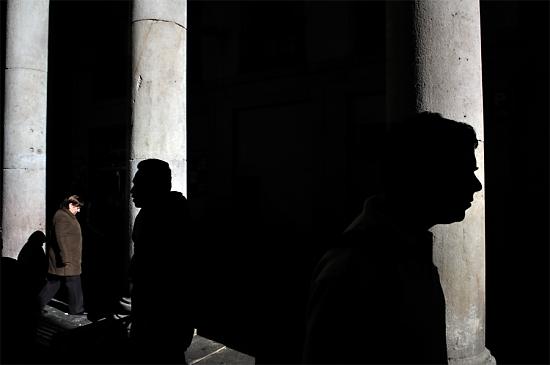
Martin Molinero
Barcelona Street Photographer
interviewed at Leica Liker
Martin Molinero posts at Enantiodromos
_______________________
Coherent fragmentation
Finding and remembering in Central Europe's confused cities
Levente Polyįk
(....)
The glittering of fin de sičcle nostalgia, the aesthetic of ruin of the transforming urban landscape, and the ready-made decorative elements of the terrace all blend the divergent segments of Central European urban memory in a unique fashion. To this day, an imagined notion of adventure and spontaneity covers these recently still infamous parts of central Pest. This notion provides a perfect breeding ground for initiatives that connect dilapidation and an acceptable level of urban impoverishment with an enthusiastic irony regarding the remains of socialism, and make use of all these in the symbolic consumer domain of entertainment. Meanwhile, the giddy heights of a flat roof, as so often rediscovered by feature films, gives the terrace the big city tone into which urban dwellers are from time to time happy to dip. The desire for the unusual, for the architecturally ghostlike, is guaranteed by the reassuring proximity of fin de sičcle luxury, on which adventurers arriving from more prestigious districts can turn their backs.
This applies equally to those arriving from more prestigious countries. The Swedish jewellery designer, as he "tries out" the black and white photos he has bought in a second-hand shop against the raw, run-down wall of the house, is happy he is no longer surrounded by that desire for sterility that rid his home city of every little mark. The cracks in the walls, the peeling plaster... the jewels of the city, he says.
(....)
4.
Capitalizing on fragments and remnants is not only a possibility for cities – it's an obligation. At odds with one another, the remnants haunt the streets and squares as much as the interiors of houses and apartments. The attitude to relics is not the same everywhere, as indicated in the comments of the Serbian foreign minister Vuk Jeremic about the bombing of Belgrade in 1999: "The reminders are here, and are certainly deeply lodged in people's memories... but we don't really need ruins as in Berlin or Hamburg, which were left there on purpose. We don't need them."
In fact, it's not clear who exactly is in need of ruins, of raw architecture lacking illusion. The dilemma facing the new Warsaw Museum of Modern Art helps to identify the East-West divide on wildness versus sterility. Conceived by the Swiss architect Christian Kerez, the building presents itself within Warsaw's urban fabric, in all its raw concrete glory, in a way that's not easy on the eye at the best of times. The wildness invoked to balance the revived sterility of western cities melts into its natural habitat in bombed-out Warsaw. Central Europe produced the aesthetic of architectural brutalism in a spontaneous fashion, without having to be asked. The firewalls and cavity plots, ruins of buildings and neglected underpasses, these places full of memories, still pop up here and there, but they increasingly exist like a plague. They remain frozen in transience, right until the day that all faults and telltale signs disappear from the face of the city, and the cities themselves close up into their own sterile presentness....(more)
_______________________

photo - mw
_______________________
Machinic Art: The Matter of Contradiction
Larval Subjects
(....)
My talk will be focused on three interrelated points. First, I’m interested in emphasizing the materiality or real autonomy of art, or that it is not simply about something, but is something. For me, works of art are objects or machines in their own right, that circulate throughout the world independent of their makers. A work of art is no less a thing or machine than a person, rock, or tardigrade. They take on a life of their own and have their own singular powers and properties. In my view, there’s a tendency to ignore the powers of art per se, to always reterritorialize it on artists intentions and audience receptions, rather than exploring the being of the work of art as a real entity in the world as such.
(....)
Second, I want to argue that works of art are machinic rather than hermeneutic. In Anti-Oedipus, Deleuze and Guattari say that the unconscious is a factory, not a theater. By this they mean that the unconscious does not represent or mean, but that it produces. I want to say that works of arts are factories or machines, not theaters. They don’t have meanings, but are powers of producing differences in the world. They are real actors. They do not represent, even in the tradition of realism, but make. I read Proust, for example, and his exquisite discussion of various emotional states has the power to actually create new forms of affect in me that I never before had. I begin to love as Proust’s characters do. The work of art is thus a factory that both transforms the artist that creates it (artists tell me that they become something else as a result of their work) and that transforms the audiences that encounter the work. Works of art are difference engines that circulate throughout the world and that transform the people and things that encounter them. Picasso’s Guernica does not represent the bombing of Guernica, but both transforms the event of that bombing, giving it a new sense, and creates an affect for the slaughter of the innocents everywhere....(more)
_______________________
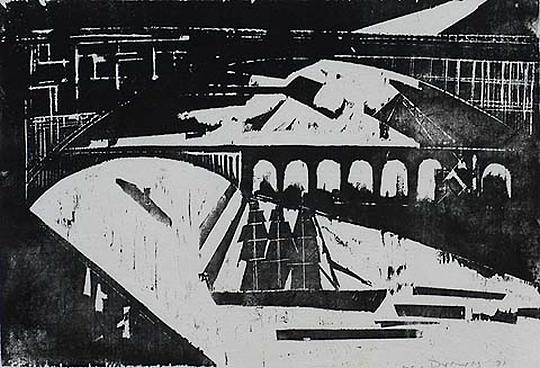
Harlem River, New York
1930
Werner Drewes
b. July 27, 1899
_______________________
Why so many communist philosophers?
Santiago Zabala
(....)
Against Fukuyama's predictions, the Occupy movement and the Arab Spring demonstrated that history calls once again for a new beginning beyond the economic, neoliberal, and international paradigms we live in. A number of renowned philosophers (Judith Balso, Bruno Bosteels, Susan Buck-Mors, Jodi Dean, Terry Eagleton, Jean-Luc Nancy, Jacques Ranciere, and others), led by Slavoj Zizek, have began to envision how such beginning would look in communist terms, that is, as a radical alternative.
This took place not only at successful conferences in London, Paris, Berlin, and New York (which were attended by thousands of academics, students, and activists) but also through such best-selling books as Toni Negri and Michael Hardt's Empire, Alain Badiou's The Communist Hypothesis, and Gianni Vattimo's Ecce Comu. Although not all these philosophers consider themselves communist - at least, not in the same way - the fact that communist thought has been at the centre of their political research permits us to ask why there are so many communist philosophers today.
Clearly, at these conferences and in these books, communism was not proposed as a programme for political parties to repeat previous historical regimes but rather as an existential response to the current neoliberal global condition....(more)
New Proposals
Journal of Marxism and Interdisciplinary Inquiry
Vol 5, No 2 (2012)
Why Marxism is on the rise again
Stuart Jeffries
.....................................................
Marx is Back
The Importance of Marxist Theory and Research for Critical Comm. Studies Today
ed C. Fuchs & Vincent Mosco
tripleC
tripleC
Cognition, Communication, Co-operation
The Open Access Journal for a Global Sustainable Information Society
_______________________
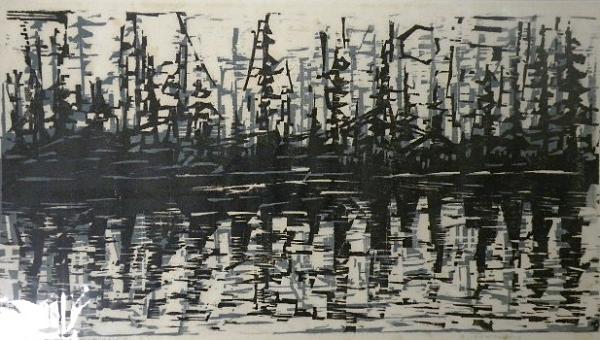
Werner Drewes
_______________________
Separate Way
Charles Reznikoff
Separate Way (1936)
Take no stock in the friendly words of friends,
for in such kindness all their kindness ends;
we go our separate ways to death.
The love of father or of mother knows
the fear of sickness, the need of food and clothes,
but otherwise--we go our separate ways to death.
Kiss after kiss of the head beside you on the cushion,
but faithful only in its fashion--
we go our separate ways to death.
If you would see the phoenix burn
and in the traffic hunt a unicorn,
well, ride the subway till your death
and hold your job till you are out of breath.
We heard your jokes, your storiues, and your songs,
know all of your rights and all your wrongs,
but we are busy with our own affairs.Sorry? O yes! But after all who cares?
You think that you have something still to say?
Perhaps. But you are growing old, are growing grey.
And we are too.
We'll spare another friendly word for you;
and go our separate ways to death.
Without house and ground (PoemTalk #56)
Charles Reznikoff, ‘Salmon and red wine’ & ‘During the Second World War, I was going home one night’ jacket 2
Charles Reznikoff at
PennSound, the Poetry Foundation and EPC
_______________________
Ten Years Of Languagehat
an ongoing celebration

photo - mw
_______________________
We Create the Conditions that Condition Us
Lance Strate
Hannah Arendt Center for Politics and Humanities
"The human condition comprehends more than the condition under which life has been given to man. Men are conditioned beings because everything they come in contact with turns immediately into a condition of their existence. The world in which the vita activa spends itself consists of things produced by human activities; but the things that owe their existence exclusively to men nevertheless constantly condition their human makers.(....)
In addition to the conditions under which life is given to man on earth, and partly out of them, men constantly create their own, self-made conditions, which, their human origin and their variability not withstanding, possess the same conditioning power as natural things."
The "conditions" that we make are used to create a buffer or shield against the conditions that we inherit, so that our self-made conditions are meant to stand between us and what we would consider to be the natural environment. In this sense, our self-made conditions mediate between ourselves and the pre-existing conditions that we operate under, which is to say that our conditions are media of human life. And in mediating, in going between our prior conditions and ourselves, the new conditions that we create become our new environment. And as we become conditioned to our new conditions, they fade from view, being routinized they melt into the background and become essentially invisible to us....(more)
_______________________

Lįszló Moholy-Nagy
b. July 20, 1895
_______________________
Nineteen Short Poems for Bill Bronk, Plus One
Mark Weiss
presented by Jerome Rothenberg
Sometimes
Sometimes an insistent picture presents itself and sometimes
one walks
into and through it like a tracking shot, but it's always
a picture. Even at a moment like this when I summon it what's lost
is the swift melding of things unseen. And sometimes
it's the slow dance
of two and the heat
and cold and a hand
one remembers, does it all
come back does it all
come back to.
Doesn't it all come back to loss and language?
What can be done
in a few words,
what can be done in words.
...(more)
_______________________
The Decline and Fall of a Translator’s Brain
Jocelyne Allen
words without borders
Just when you think you’ve figured out what is going on in the Toh Enjoe story “The History of the Decline and Fall of the Galactic Empire,” you trip on another oblique reference to some bit of the outside world.(....)
After filling my head with seafaring ghosts and finding none that had the same timeless advice quality to them as this story of fishermen and ladles, I opted to focus on the ship part of the equation and substituted “bail bucket” for “ladle," a choice that doesn’t completely satisfy me since the ghostliness is now missing from that sentence. But forcing a ghost into the sentence seemed out of character with the matter-of-fact delivery of the Japanese.
For some reason, the references that led me on the longest chases were all delivered in this removed tone, so much so that I immediately began digging deeper on phrases that seemed a little too distanced. But EnJoe thoughtfully included some obviously insane phrases to make my job a little easier, most notably, “Abraham has seven young emperors.” Open Google....(more)
_______________________

photo - mw
_______________________
The Future of Memory
Jonathan Gray
(....)
... We constantly rewrite ourselves and remould our past. Those neglected extremities which are strangely fresh and less familiar to us are either re-illuminated, and hence redrafted, or otherwise remain shrouded in obscurity. After successive redrafting one might reasonably expect harmony and resonance to win out over accuracy. Meaningful shapes come into relief out of the raw blocks of sense, becoming more familiar with every recollection. These shapes are shoehorned into recognisable motifs and recurring patterns, which characterise not only the near and distant past, but also our immediate experience, as it settles into our malleable mental wax.
This process of fixing and reforming, reworking and remoulding is a fundamental part of what it is to be human. First and foremost, we formulate and negotiate versions of occurrences in language, which furnishes us with our universe of meanings, an immense constellation of semantic planets, small centres of gravity around which sense and memory can cluster. For millennia we have translated, transformed, and transfigured our individual and shared memories into conversation, ink, paper, singing, music, painting, performance: ornate figures, steps, the vibration of vocal chords, string, reeds, pipes, brass, patterns of colour depicting scenes with increasing accuracy and resemblance, aided by mirrors and secret techniques.
Technologies that capture and reproduce light and sound have dramatically enlarged the possibilities for articulating and retelling what happens to us, such that we have been able to sing with moving images and paint with sound. By moving from a state of speculative investigation and serendipitous discovery to highly organised reconnaissance raids on creation’s secrets, our vocabulary for representing things has expanded at an astonishing rate. We are creating an increasingly rich electronic echo of our experience and of the world around us – harvesting light, sound, movement, signal, speech and touch, transmitted and synchronised using invisible waves and configurations of light and magnetism. While we still think of memories being captured, stored and replayed in the form of physical objects – paintings, books, wax discs, tape cartridges, compact discs, hard drives, and electronic devices – we are moving towards a world in which our memories will surround us, whether through new display technologies, retinal projection or direct neural interfaces.
One wonders how an all-encompassing electronic echo might affect the way we create and relate to our memories. ...(more)
The Junketvia Steve Himmer
_______________________

photo - mw

John Szarkowski
1 2
_______________________
Ballad About False Beacons
Yevgeny Yevtushenko
b. July 18, 1933
Translated by Anthony Kahn
…and those far, elusive lights plunged the souls of seamen into darkness, offering them false hope…
From an ancient pilot’s manual
We’ve been bewitched by countless lies,
by azure images of ice,
by false promises of open sky and sea,
and rescued by a God we don’t believe.
Like coppers rattling from a beggar’s plate
guiding lights have fallen on our days
and burned and died.
We’ve pressed our ship
a pilgrimage of nights toward such lights
as, always elusive, lured and tricked
the keel upon the rocks and ripped
the helmhold from the hand and lashed
the beggared palm to scraps.
Ice tightens at the bow and breath.
To dock, to dropp the anchor to its rest,
to drift (a dream!) on waters quieted
and calmed. We can’t. We’re after a mirage.
(The whiskered walrus brays; the sea salt thaws.
Again, we’re off!)
Raised on powdered milk, we’ll have no faith
in beacons any longer, nor mistake
real for fake, or waking for a dream.
Beacons can’t be trusted. Trust instead
the will of your own hand and head.
Again the captain waves his glass,
sights a beacon, turns and cries
‘Helmsman! There’s a beacon. Are you blind? ‘
But Helmsman, with the truer eye
thinks mutiny and grumbles,
‘A mirage.’
_______________________
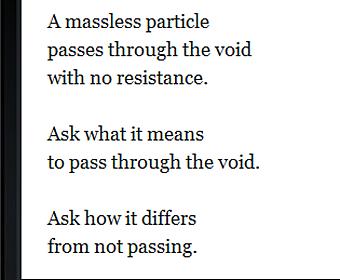
Chirality
Rae Armantrout
Poem Flow a poem-of-the day application on the Apple app platform.
Each day a new poem flows to thousands of screens around the world. Everyone receives the same poem on the same day creating an instant, invisible community of simultaneous readers. The poems are from a mix of the greatest poems in English. Turned in your hand, each poem dissolves in a gentle reading animation. Turned back, the original poem returns.
_______________________
Fellow Prisoners
John Berger
guernica
(....)
I’m not searching for a complex definition—there are a number of thinkers, such as Zygmunt Bauman, who have taken on this essential task. I’m looking for nothing more than a figurative image to serve as a landmark. Landmarks don’t fully explain themselves, but they offer a reference point that can be shared. In this they are like the tacit assumptions contained in popular proverbs. Without landmarks there is the great human risk of turning in circles.
***
The landmark I’ve found is that of prison. Nothing less. Across the planet we are living in a prison.
The word we, when printed or pronounced on screens, has become suspect, for it’s continually used by those with power in the demagogic claim that they are also speaking for those who are denied power. Let’s talk of ourselves as they. They are living in a prison.
What kind of prison? How is it constructed? Where is it situated? Or am I only using the word as a figure of speech?
No, it’s not a metaphor, the imprisonment is real, but to describe it one has to think historically....(more)
_______________________
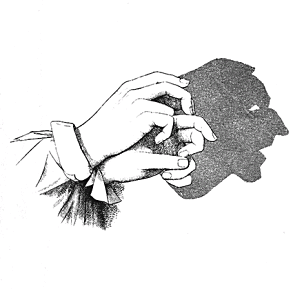
fear
Hand Shadows
To Be Thrown Upon The Wall
Henry Bursill
1859
_______________________
Port Huron Project
a series of reenactments of protest speeches from the New Left movements of the Vietnam era.
_______________________
Obedience to Authority and its Discontents
John Cash
With numbing regularity good people were seen to knuckle under to the demands of authority and perform actions that were callous and severe. Men who are in everyday life responsible and decent were seduced by the trappings of authority, by the control of their perceptions, and by the uncritical acceptance of the experimenter’s definition of the situation into performing harsh acts. (Milgram, Obedience to Authority)
As indicated in the epigraph above, Stanley Milgram’s famous, and somewhat infamous, social psychology experiments concerning ‘obedience to authority’ reveal a sad and sorry human tendency. Indeed, Milgram was initially appalled, if also fascinated, by the frequency with which his subjects would obey the order to apparently inflict ever-increasing levels of electric shock to the ‘learners’ they were instructed to ‘teach’. The capacity to resist authority by taking personal responsibility for one’s actions and their effects was far more compromised than he had anticipated. Milgram’s research, conducted in the United States in the early 1960s, revealed that most people would obey an authority figure when instructed to administer severe electric shocks as punishment for a failure to learn; up to the 450-volt level on the imposing shock generator they were required to operate. This brute fact of routine obedience is the way the Milgram study is usually reported. What this obscures is the recurrent attempts by many of the research subjects to reclaim responsibility as the experiment’s awful scenario unfolded. By re-visiting the Milgram studies, this essay aims to catch and reflect upon the drama of subjectivities in process as they negotiate responsibility in often partial, fragile and still-born, but sometimes resolute ways; always under the shadow of the chilling, often deadening, call to obey....(more)
_______________________
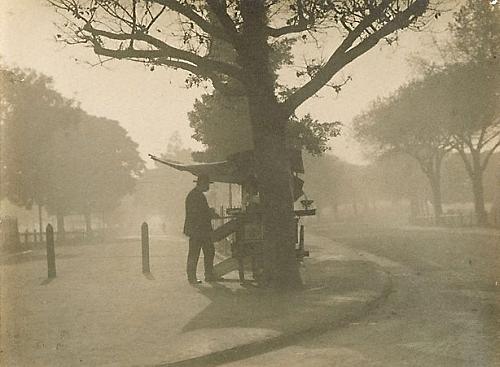
James S Stening
circa 1903-1910
via
_______________________
The commons: beyond the market vs. state dilemma
Joan Subirats
opendemocracy
Elinor Ostrom, the Nobel Prizewinner who died this week, pioneered this work. Value is created through the logic of sharing with others in an open and even casual way. Innovation is no longer a monopoly, unassailably colonised by mercantile initiative. _______________________
Place and the Intellectual Politics of the Past
Tim Hitchcock
Historyonics
Currently there is a rather wonderful raproachment between historical geographers and historians; with archivists and librarians (as usual) providing the meat, gristle and spicy practical critique. This is brilliant. These are cognate disciplines which need to be in constant dialogue. The habits of mind and analytical tools of geographers need to inform our understanding of the past; while the mental ticks of the historian, and the authority of history as a literary genre, are necessary tools for communicating all kinds of memory to a wider audience.
(....)
To deal with historians and the infinite archive first - I don’t think that historians have quite twigged it yet – though librarians and archivists certainly have - but the rise of the ‘infinite archive’ has fundamentally changed the nature of text. It has turned text in to ‘data’, with profound implications for how we read it, and deploy it as evidence.
(....) ... some people stand in the same place longer than many buildings; and have a greater right to appear on a map, than many landmarks. As we move towards that new data rich environment of text/data and intuitive GIS; as naļve historians and the wider public, come to use the ideologically laden genre that is a map as an interface for trillions of words of text; and as they step back from their own text to view text/data from afar, I just think it is important to remember that landscapes and cityscapes only exist between the ears of their denizens - that we cannot map the subtleties of Ludgate Hill and New Bridge Street without trying to know Charles Mackay. With Lewis Mumford, we need to ensure that we are not 'completely negligent of the human contents or the human results' of asking the questions only computers can answer.
...(more)
via Digital Humanities Now
_______________________

The Face of Minnesota
John Szarkowski
google booiks
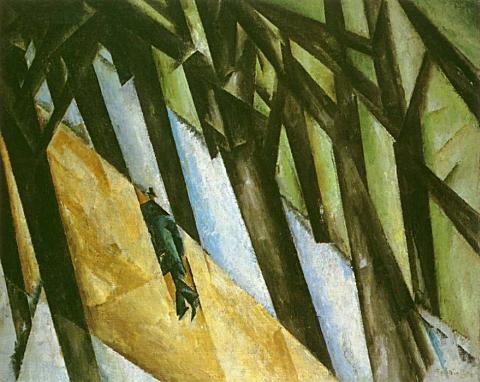
Alley
Lyonel Feininger
1915
_______________________
Powers of Recuperation
Adrienne Rich
1.
A woman of the citizen party—what’s that—
is writing history backward
her body the chair she sits in
to be abandoned repossessed
The old, crusading, raping, civil, great, phony, holy, world,
second world, third world, cold, dirty, lost, on drugs,
gangrenous, maiming, class
war lives on
a done matter she might have thought
ever undone though plucked
from before her birthyear
and that hyphen coming after
She’s old, old, the incendiary
woman
endless beginner
whose warped wraps you shall find in graves
and behind glass plundered
2.
Streets empty now citizen rises shrugging off
her figured shirt pulls on her dark generic garment sheds
identity inklings watch, rings, ear-studs
now to pocket her flashlight her tiny magnet
shut down heater finger a sleeping cat
lock inner, outer door insert
key in crevice listen once twice
to the breath of the neighborhood
take temperature of the signs a bird
scuffling a frost settling
… you left that meeting around two A.M. I thought
someone should walk with you
Didn’t think then I needed that
years ravel out and now
who’d be protecting whom
I left the key in the old place
in case
...(more)
_______________________

Lyonel Feininger
_______________________
this flying forwards backward,
this missnessing, it has to do
more with everything-
Augusto de Campos and Emily Dickinson translation experiments by Eric Ellingsen and others
conjunctions
On the side I do my lusters for Emily
1)
Please forgive my fingers, I don’t think they are all liars.
Which way is the earth rotating? Now
if I can rose things right, then.
Then is the secret staying closer
to the ruins right here? Is this the place
where I rather starts? Is this the place
where censors are cosmically sensitive to being
censors? Is this where the warpath vocabulary
warpaths? Overlooks the discordant
harmony of honey, unpacks the brain swallowed chirps.
This multi-everything. This missnessing. This shiny predation. This
the winds’ starting place. Where winds dream blew blue.
The place where all jewelry starts. This is where birds trade stories
of ‘twill, play in the dark
while our honest fingers eyes close. ...(more)
_______________________
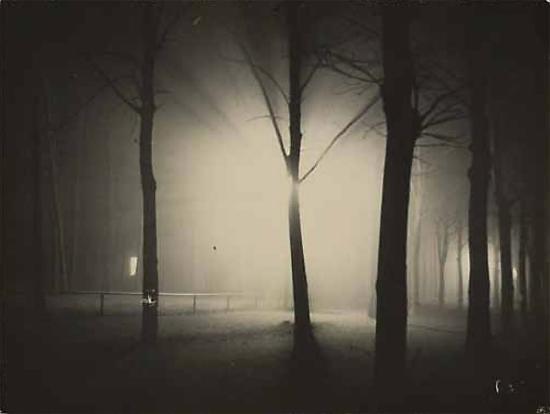 Lyonel Feininger
1928
_______________________
"It's not that we can't take a man who is 45 years old and turn him into a good soldier. It's that we can't make him love it."
Mad, bad, sad: What really happens to US soldiers
Nan Levinson
(....)
A couple of decades ago, Dave Grossman, a professor of psychology and former army ranger, wrote an eye-opening, bone-chilling book called On Killing. It begins with the premise that people have an inherent resistance to killing other people and goes on to examine how the military overcomes that inhibition.
On Killing examines the concerted effort of the military to increase firing rates among frontline riflemen. Reportedly only about 15 to 20 per cent of them pulled the trigger during World War II. Grossman suggests that many who did fire "exercised the soldier's right to miss". Displeased, the US army set out to redesign its combat training to make firing your weapon a more reflexive action. The military (and most police forces) switched to realistic, human-shaped silhouettes, which pop up and fall down when hit, and later added video simulators for the most recent generation of soldiers raised on virtual reality.
This kind of Skinnerian conditioning - Grossman calls it "modern battleproofing" - upped the firing rate steadily to 55 per cent in Korea, 90 per cent in Vietnam, and somewhere near 100 per cent in Iraq. Soldiers are trained to shoot first and evaluate later, but as Grossman observes: "Killing comes with a price, and societies must learn that their soldiers will have to spend the rest of their lives living with what they have done."
That price could be called moral injury....(more)
_______________________
 Mellingen V
Lyonel Feininger
1918
_______________________
We Live in the Biggest Company Town on Earth
Chris Hedges,
(....)
Sound familiar? It is an old and cruel tactic in any company town. Reduce wages and benefits to subsistence level. Break unions. Gut social assistance programs. Buy and sell elected officials and judges. Fill the airwaves with mindless diversion and corporate propaganda. Pay off the press. Poison the soil, the air and the water to extract natural resources and leave behind a devastated wasteland. Plunge workers into debt. Leave them owing more on their houses than the structures are worth. Make sure the children will be burdened by tens of thousands of dollars lent to them for an education and will be unable to find decent jobs. Make sure that everything from hospital bills to car payments to credit card fees exact increasing pounds of flesh. And when workers stumble, when they cannot pay soaring interest rates, jack up rates further and deploy predators from debt collection agencies to harass the debtors and seize their assets. Then toss them away. Company towns all look the same. And we live in the biggest one on earth....(more)
_______________________
The Thing That Eats The Heart
Stanley Kunitz
The thing that eats the heart comes wild with years.
It died last night, or was it wounds before,
But somehow crawls around, inflamed with need,
Jingling its medals at the fang-scratched door.
We were not unprepared: with lamp and book
We sought the wisdom of another age
Until we heard the action of the bolt.
A little wind investigates the page.
No use pretending to the pitch of sleep;
By turnings we are known, our times and dates
Examined in the courts of either/or
'While armless griefs moundt lewd and headless doubts.
It pounces in the dark, all pity-ripe,
An enemy as soft as tears or cancer,
I whose embrace we fall, as to a sickness
Whose toxins in our cells cry sin and danger.
Hero of crossroads, how shall we defend
This creature-lump whose charity is art
When its own self turns "Christian-cannibal?
The thing that eats the heart is mostly heart.
- from "This Garland, Danger", in Selected Poems: 1928 - 1958
_______________________
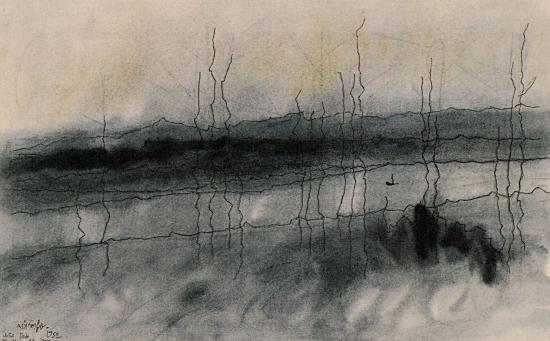 Mystic River
Lyonel Feininger
b. July 17, 1871
_______________________
The Future of Philosophy
Cosmos and History: The Journal of Natural and Social Philosophy
Vol 8, No 1 (2012)

photo - mw
_______________________
Peep/Show
....A Taxonomic Exercise in Textual and Visual Seriality....
Peep/Show
Special Feature Issue: Robert Kelly
Introduction by Ron Silliman
Lattices Inspired
(....) I intersect myself
some part of me is always
isolate from the rest
I derive from myself
How do I reach the closed
domains brought in by
self-intersection? This is
Plato’s secret quest.
Porphyry’s, Proclus’s.
Mathematics of the soul.
(....)
If a square is a door
the sea comes in.
Wet-ankled mathematics,
pale students of the moon.
But if the square is a window
or a mother or a willow
wind howls and things
ease up outside, things
soon enough turn into trees.
Again. An even number of trees.
Robert Kelly at epc
_______________________

The World From My Front Porch
Larry Towell/ Magnum Photos
youtube
_______________________
Two Lines Online July 2012
Center for the Art of Translation
Small World
Markus Orths
Translated by Susan Thorne
(....)
I was bewildered by the resemblance between the Mayan woman and Elisabeth Obschruff. It was like having something wake up which had been hibernating in my head for years. I started to look more closely at the people I ran into during the rest of my vacation: if I looked into an unfamiliar face, I immediately asked myself who it reminded me of. If I heard a strange voice, I tried to relate it to a voice that I knew. If a new acquaintance used a particular hand gesture, I immediately compared it to the gestures of somebody from Hohenmemmingen. And I always found a similarity: I managed to relate the strangers to my own familiar world every single time. I parted the veil of foreignness and looked through at the ostensibly new; I peeked behind the faēade and saw what was actually there: familiarity and eternal sameness. And what’s more, behind that eternal sameness, that familiarity, I quickly sensed ordinariness, and behind that ordinariness lurked a universally prevailing boredom, the tedium of existence.
Back in the Swabian Alb region, I asked myself why people bother traveling to other, new worlds when those other, new worlds only appear different and new but really are just the same as the old familiar world. Traveling only makes sense, I mused, if it broadens your awareness and opens up your narrow personal world with the power of novelty. If you look behind things, behind appearances, you will be looking—to put it plainly for once—you will be staring right at the face of Truth like I did in Chiapas, and you’ll just have to accept that nothing is really new; and if there’s nothing really new, I thought, then travelling is reduced to a farce. In fact, I told myself, when you come to know what you already know, you know everything....(more)
_______________________
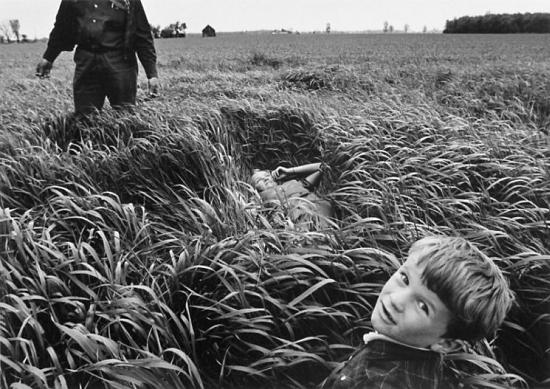
Larry Towell
1 2 3
_______________________
Rock the Boat.
Localised Ethics, the Situated Self and Particularism in Contemporary Art
Tere Vadén and Mika Hannula
pdf available at aaaaarg - free reg. req.
We begin by offering our definition of locality, while at the same time anchoring our project and bringing in strategies and examples from contemporary art. ... We continue via questions of locality and experience, going further into the conflictual elements of this relationship, focusing on the ethics of particularism, and conclude by raising the issue of civil society and the Byzantine beauty of glorious failures.
_______________________
What to Make of Finnegans Wake?
Michael Chabon
(....)
... I came up against the safety perimeter, beyond which there lurked, hulking, chimerical, gibbering to itself in an outlandish tongue, a frightening beast out of legend.
(....)
Seventeen years of tireless labor by a mind blessed with a profound understanding of human vanity, with unparalleled gifts of sensory perception and the figuration thereof, and with one of the greatest prose styles in the English language produced a work that all too often, and for long stretches, can remind the reader (when not recalling Yertle the Turtle) of the Spike-Milligan- meets-Edward-Lear prose tossed off by the Writing Beatle in five minutes between tokes and takes of “Norwegian Wood.” But to find disappointment in the Wake’s, and Joyce’s, supposed turn away from approved modernist procedure, derived from Flaubert, which subjects shifting states of consciousness to the same rigorous accounting as the bibelots furnishing a provincial lady’s sitting room, is to miss the point.
(....)
Finnegans Wake is nowhere a work of fantasy or caprice, least of all at its most fantastic and capricious. In Ulysses, like Proust conducting his researches into lost time, Joyce showed that the clear eye and steady hand of the realist were adequate to the task of portraying states of consciousness, however fleeting or fragmentary, however stretched or shivered or distorted by the passage of time. In Finnegans Wake, with characteristic chutzpah, Joyce trained that modernist instrumentation on the stream of unconsciousness, and thereby, perhaps without meaning to do so, found realism’s limit.
To write a novel is to betray it, and in this regard Finnegans Wake is only a book like any other; but it’s also, at the same time, a celebration of that betrayal, as wakes are always celebrations, and an act of defiance against the impossibility of realizing the dream, as the fallen builder Tim Finnegan, in the ballad that lends its title to Joyce’s book, defies death itself for the sake of a drop of Jameson’s. “I’m at the end of English,” Joyce is said to have declared, as he began work on Finnegans Wake; and so he ventured beyond that fatal bourne.
This, to me, was the wisdom—the potable water, the fungible currency, the capering troop of Sea-Monkeys—left me by the Wake. If the language we have inherited, have had imposed upon us, proves unfit to our purpose in catching hold of the darting apparition of our dream book (as it always will, for the job is impossible), then we must reinvent it. The writing of every novel, and not just some polyglot punster’s babbling Book of Kells, requires this act of invention, the creation of a personal Volapük. For each book you must devise an idiolect, a working creole you compound by embedding the fine-grained matrix of your mother tongue with the coarse aggregate of the world—a Yiddish-speaking Alaskan Jerusalem, a four-color Nazi-haunted Metropolis, a nighttown Pittsburgh of gangsters and gay boys—that you have dreamed, with its argots and geographies, ethnologies and etiquettes. The limits of language are not the stopping point, says the Wake; they are the point at which we must begin to tell the tale....(more)
_______________________

photo - mw
_______________________
'The Death of Evidence' in Canada: Scientists' Own Words
Vance L. Trudeau, professor of biology, University of Ottawa:(....)
"Either the government is very poorly advised, or they are part of an ideology that is anti-science and against making educated, well-informed decisions in the best interest of a dynamic, pluralistic society. I cannot make this judgment myself. I will leave it to the people of Canada to decide.
"However, the tendency to only use the data and evidence you 'like' is the misuse of information for alternative purposes. This is known as propaganda. If you think 'this can't happen in Canada,' then you are disregarding the very evidence the government is providing us by their own actions.
"Prime Minister Harper has said that we will not recognize Canada when he finishes with us. He is clearly missing some history lessons. Unfortunately, aspects of his government's social and environmental policies remind me of the Duplessis-era Québec and Canada in the 1950s."
...(more)
The Death of Evidence
_______________________
This global financial fraud and its gatekeepers
The media's 'bad apple' thesis no longer works. We're seeing systemic corruption in banking - and systemic collusion
Naomi Wolf
(....)
The notion that the entire global financial system is riddled with systemic fraud – and that key players in the gatekeeper roles, both in finance and in government, including regulatory bodies, know it and choose to quietly sustain this reality – is one that would have only recently seemed like the frenzied hypothesis of tinhat-wearers, but this week's headlines make such a conclusion, sadly, inevitable.
(....)
It is very hard, looking at the elaborate edifices of fraud that are emerging across the financial system, to ignore the possibility that this kind of silence – "the willingness to not rock the boat" – is simply rewarded by promotion to ever higher positions, ever greater authority. If you learn that rate-rigging and regulatory failures are systemic, but stay quiet, well, perhaps you have shown that you are genuinely reliable and deserve membership of the club. ...(more)
_______________________

photo - mw
_______________________
The fiction of a free internet
Musab Younis
(....)
Here is a simple fact that is almost never directly stated: were it possible for Facebook, Google and Twitter to show only advertising and nothing else while maintaining their audiences, that is precisely what they would do. Advertising is not a side-project, a minor annoyance, an excrescence, an intrusive addition: it is the fundamental basis upon which the main internet companies make their decisions; it is the reason they exist.
We might go further and add that most content online — what most people think the internet is – is quite literally a sideshow. Seamus Simpson observed eight years ago that “the Internet has been developed and shaped by governmental interests” as “a space within which internationalization of capitalist production … can be further extended and deepened.” Such interests have promoted the logic of a system that “prioritizes the commercial and trademark rights of business” resulting in “an irreversible commercialization of the Internet … primarily geared to the broad exigencies of expanding information and communications technology (ICT)-based global capitalism.”As far back as 1995, Simpson pointed out, Harry Cleaver had suggested that
[p]ioneers of cyberspace can create new spaces for their own (very social) purposes (pleasure, politics, etc.) as part of a process of self-valorisation that at least initially threatens or transcends existing norms of capitalist society. Corporate capital then tries either to enclose their spaces by commercialising them if they look profitable, or to crush them if they look dangerous.
The question ‘why should we care?’, delineated, gives us some interesting lines of inquiry....(more)
|

